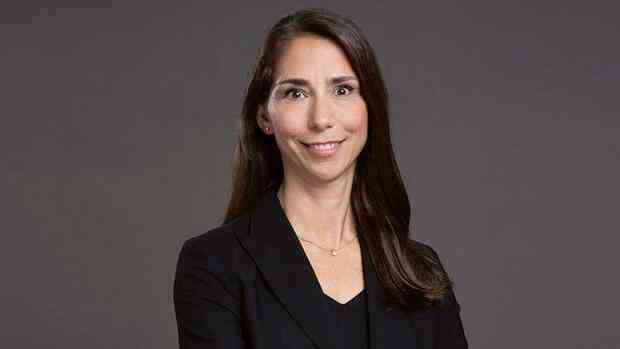As Managing Director of the Federal Finance Agency, she was also responsible for the Economic Stabilization Fund until October.
(Photo: PR)
Dusseldorf Germany’s largest gas importer Uniper is getting four new supervisory board members as part of the nationalization. The new chief controller will be Tom Blades, as the company announced on Wednesday. The former manager of Siemens and Linde was CEO of the industrial service provider Bilfinger from 2016 to 2021.
In addition, Jutta Dönges will join the supervisory board. Until October, she was managing director of the federal finance agency, where she was responsible, among other things, for the economic stabilization fund, which saved companies like Lufthansa and Tui from going out of business in the corona crisis.
The investment banker Marcus Schenck from the US bank Lazard, who was already involved in the stabilization of Uniper in an advisory capacity, and Ines Zenke, co-owner of the commercial law firm Becker Büttner Held, are also new to the board.
In the course of the energy crisis, Uniper has to be rescued by the state with up to 33 billion euros. The company no longer receives gas supplies from Russia, but must continue to supply its own customers. In order to continue to supply hundreds of German municipal utilities and industrial companies, the federal government is to take over almost all of Uniper.
Top jobs of the day
Find the best jobs now and
be notified by email.
The step is to be sealed on December 19 at an extraordinary general meeting. The previous parent company, the Finnish state-owned company Fortum, will then sell its shares to the German state. As a result, the four Fortum representatives are also retiring from the Supervisory Board.
The first reactions to the new supervisory board members are mostly positive. An industry insider said: “Overall, a balanced mix that is pleasantly apolitical.” The selection suggests that Uniper is relying more on competence than on celebrities when it comes to filling the Supervisory Board. In the summer there was a rumor that the energy economist Claudia Kemfert, who is often featured in television programs, could move into the supervisory board.
The former Bilfinger boss is to head Uniper’s supervisory board in the future.
(Photo: imago images/sepp spiegl)
Tom Blades brings energy experience and hydrogen expertise, which is a strategically important business for Uniper, the insider says. Jutta Dönges has the right top management experience, especially for distressed companies. Schenck is a neutral candidate with appropriate experience in the energy and financial sectors.
Shareholder protectors are demanding clarity from the federal government about Uniper’s strategy
From another place it says with a view to the lawyer Ines Zenke: Her law firm Becker Büttner Held represents numerous public utilities in Germany, which in turn are dependent on Uniper. This could bring Zenke into conflicts of interest in her new role.
“The new members of the Supervisory Board have a broad base, which is a good composition. I think that’s a very good solution,” says a company insider.
>> Read also: Comment: The G7 climate club is well intentioned – but in the end it is no longer just symbolic politics
In the run-up to the change, Uniper had hoped that with the state entry, people with economic expertise would also move onto the supervisory board, who could open doors both nationally and internationally. Uniper CEO Klaus-Dieter Maubach said on Wednesday: “I am very pleased about the early nomination of the new Supervisory Board members, who have outstanding energy and financial expertise.”
Other companies, such as RWE, seem to be better positioned to invest in renewable energy on an industrial scale. Ingo Becker, analyst at Bank Kepler Cheuvreux
It remains unclear how Uniper will strategically align itself in the future. Shareholder protectors criticized this uncertainty. Thomas Hechtfischer, managing director of the German Association for the Protection of Securities (DSW), told the Reuters news agency that after the takeover the federal government had to quickly clarify how to proceed. The question is whether there is a perspective for private investors: “What is the strategy?”
A successful state takeover depends on the approval of the main shareholder Fortum, who last held 80 percent of Uniper shares. But so far there are also various minority shareholders, some of whom are represented by DSW. The implementation of the planned rescue package for the gas trader should lead to a federal stake in the group of 99 percent.
Since 2020, Uniper has had the goal of becoming climate-neutral by 2035. By then, the group wants to focus its portfolio on the production of green gas, hydrogen and renewable energies. However, when it comes to power generation from renewable sources, there are doubts in the industry that the company will get involved on a significant scale.
Analyst Ingo Becker from Bank Kepler Cheuvreux says: “Other companies, for example RWE, seem to be better positioned for investments in renewable energies on an industrial scale.”
More: Unrest at Uniper: Gas company will probably have to sell power plants

